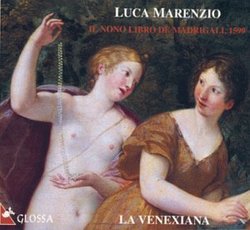An extraordinary CD from a master of the Cinquecento
Sator | Sydney, Australia | 06/23/2005
(5 out of 5 stars)
"Marenzio's Ninth and final Book of Madrigals is justly famous for its daringly exotic use of chromaticism for dramatic and expressive effect, that contrasts with his other more pastoral sounding compositions. Although he is often compared to Carlo Gesualdo as a result, Gesualdo's chromaticisms arrive much less prepared, in a much more shocking and disorientating manner than in Marenzio, even if Marenzio is ultimately more radical in his use of chromaticism. In this regard Marenzio's chromaticism comes across much as it does in the radical chromaticism of Richard Wagner and his Zukunftsmusik (music of the future) - only Marenzio of the Cinquecento was writing some three centuries before him! Further inviting comparison to Wagner is the use of strange chordal juxtapositions, with exotic dissonances and strings of suspensions being the norm in a sequence of madrigals that revolve around themes of abandonment and melancholy. Given that Marenzio's madrigals have occasionally been seen as the peak of the genre, the Ninth Book may possibly be amongst the greatest of all books of madrigals.
La Venexiana share a number of members with Rinaldo Alessandrini's universally acclaimed Concerto Italiano. They share the same beautiful ensemble work and deeper understanding of the madrigalian word colourings those of non-native Italian speaking ensembles. They relish the chromatic word paintings that Marenzio uses in their exploration of his exotic sound-world. The command by these Italian groups of this repertoire is such that the previous efforts by groups such as the Consort of Musicke - important in their time - seem embarassing by comparison. Rinaldo Alessandrini wrote in the November 1999 issue celebrating the 400th anniversary of the composer's death in 1499:
"However, this [modernised pronounciation] is not nearly so bad as the barbarisms of singers whose mother tongue is not Italian, who are often deluded into thinking that an indiscriminate doubling of consonants (especially the Y and the T) can re-create the sound of the Italian language. To my astonishment, I have often heard the word 'dolore' changed to 'dol-lore', also with both 'o' sounds open to the point of sounding ridiculous. (Both the 'o's in 'dolore' are dark, the second a shade more than the first.)"
We must really hand it to these Italians who really have the field all to themselves now. Eric van Tassel in Goldberg early music magazine wrote that "La Venexiana is the best madrigal consort currently active in the recording studio. They choose excellent repertoire, sing in tune, listen sensitively to one another and phrase responsively, paying close attention to the words, and adapting their style to each composer's special qualities."
As for the gentleman who claims the group 'butchers' these madrigals, readers are urged to keep in mind that his sweeping claims could equally be levelled against nearly every recording of madrigals you could care to name. Why single this particular recording out just to make the point that Italian madrigals ought to be performed in a more theatrical manner where La Venexiana take pains to avoid hystrionics? In fact some critics feel that compared to their reserved English rivals La Venexiana are at times delightfully colourful, whose historically informed decisions to perform these works written for the cognoscenti tend towards delicious refinement.
Critical acclaim, even from specialist early music magazines has been unanimous in its praise of this recording.
Ian Fenlon in Gramophone gave this CD an excellent review saying that:
"The architecture of individual phrases is beautifully shaped and finished, and the structure of the whole finely paced. Overall tone is firm and intense, and the ensemble nicely voiced. It is a delight to escape from crudely melodramatic interpretations in which opposing words or ideas are matched to rather mannered dynamic contrasts; here there is something far more subtle and intelligent. Marenzio's Nono Libro is not easy music, but it could hardly have had more powerful advocacy."
Brian Robbins writing in Goldberg early music magazine added to the growing list of rave reviews for this CD. Giving this recording the prestidious Goldberg five star rating, he wrote:
"Unquestionably another five-star recommendation to add to that given to La Venexiana's recording of Monteverdi's Seventh Book of Madrigals in Goldberg 7. In a sense the present issue is of even greater value, since this represents the first complete recording of what was to be Marenzio's final publication...La Venexiana's performances ideally capture the passionate introversion encapsulated in these marvellous pieces, while Glossa's recording is first-rate... An absolute must"
Finally harpsichordist Fabio Bonizzoni included this amongst his 10 desert island CDs in an interview with Goldberg early music magazine saying: "Listen carefully to this album and true musical treasures will be revealed." I must add that I agree completely with that sentiment.
These are indeed exquisitely beautiful performances that fully deserve the almost universal lavish praise heaped on them. They simply demand to be heard. I heartily urge anybody interested in early music, or who has enjoyed the Concerto Italianos recordings of other madrigalists to check these extraordinary works out and to judge this lovely CD for themselves. The recording quality is also very good."


 Track Listings (14) - Disc #1
Track Listings (14) - Disc #1